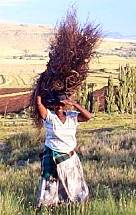Last night, HBO aired a new documentary, Unchained Memories: Readings from the Slave Narratives. In the 1930’s, researches went out and recorded oral histories from former slaves that were still alive. They are archived at the Library of Congress.
In the documentary, African-American actors and other celebrities read from the narratives, interspersed with photos, drawings, and paintings from the era of American slavery. The readings were well done, the cinematography simple and effective, and the memories and pictures were difficult and heart-wrenching.
I was struck with many emotions while watching the show. Among them were the similarities between day-to-day life as a slave in America with that of some black South Africans today. Black life on a plantation in the American South prior to 1865 is hard to distinguish from black life on a white-owned horse farm in the Eastern Cape today.



It is easy to draw parallels between American slavery and South African Apartheid. Or between American Indian reservations and Apartheid. But we should not try to make them too similar. The day to day life of many impoverished slave-like laborers is very similar: hard, long, grueling days of work; not enough to eat, especially healthy foods; no right to choose where they live; fear of punishment, maiming, and death at the master’s hand; use of religion to promote their inferiority; denial of education and other opportunities for growth; and many others.
But the political context of these systems is fundamentally different. We should not apply the same expectations to a South African black that we do for an African-American.
The most important difference to me is that South Africans were under Apartheid until the free elections of 1994, well into our modern technological era. They are currently in the throes of building a new nation. The issues that African-Americans face are more subtle and mature. In South Africa, the recent past of slavery and Apartheid is still raw and pulsing.
Don’t watch HBO’s documentary and go away feeling that slavery was awful, but it’s all better now and that’s all in the past. There are many places in the world where this kind of life is still the daily expectation of millions of people. We should not rest in comfort.
